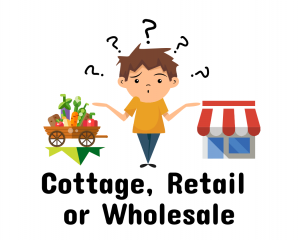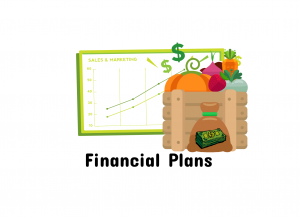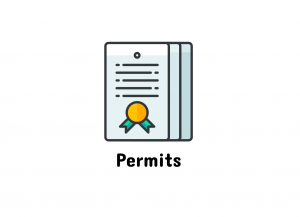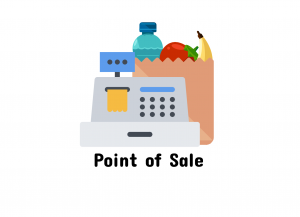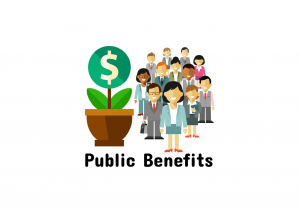
There are two ways to accept SNAP benefits. Photo by Artem Beliaikin.
A farmers market has real value when it includes all members of the community, and accepting public benefits allows every farmers market business to be accessible and inclusive for everyone.
Public benefits can help increase revenue at a farmers market and expand sales by increasing the potential customer base. By integrating public benefits such as EBT into the point of sale, farmers market businesses can be an inclusive asset to the community while also generating a more robust market. This guide will explain the most common benefit programs and how to integrate them into a point of sale system.*
SNAP Benefits
The Supplemental Nutrition Assistance Program (SNAP), formerly known as “food stamps,” is a federal program administered by the United States Department of Agriculture’s Food and Nutrition Service (FNS) to increase opportunities for low income people to purchase nutritious food. A growing number of farmers markets and farmers market vendors are beginning to accept SNAP benefits as a way to make fresh and local food more accessible to people with low or no income. There are two ways to accept SNAP benefits; a farmers market can accept SNAP benefits on behalf of the vendors and reimburse vendors for SNAP transactions, or a farmers market vendor can accept SNAP benefits directly from customers.
Accepting SNAP benefits provides a great opportunity to expand the customer base, increase sales, and make farmers markets accessible to more people. There are a few drawbacks to accepting SNAP benefits, as not all food items qualify as a SNAP-eligible purchase. The USDA requires brief training for businesses to identify which food products qualify in the SNAP program, and businesses must abide by eligibility guidelines to avoid fraud. Some recommendations for integrating SNAP into the POS include to:
- Treat customers using SNAP the same as those using cash and credit
- Devise an efficient and discrete means to make a SNAP transaction that does not alienate the customer
- Clearly post all products that do and do not qualify as a SNAP-eligible purchase
- Refrain from referring to SNAP as ‘food stamps’ because that term carries a negative connotation in some communities.
For more information on implementing SNAP at Florida farmers markets, visit the Farmers Market Legal Tool Kit
WIC Coupons
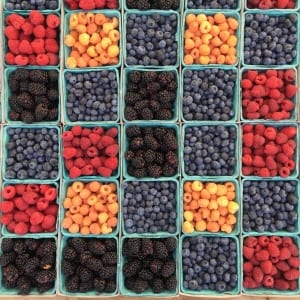
A growing number of farmers markets and farmers market vendors are beginning to accept WIC benefits as a way to make fresh and local food more accessible to women, infants and children. Photo by William Felker.
The Women, Infants and Children (WIC) Program provides supplemental foods no cost to low-income pregnant, breastfeeding and non-breastfeeding post-partum women, and to infants and children up to 5 years of age, who are found to be at nutritional risk. Like SNAP, a growing number of farmers markets and farmers market vendors are beginning to accept WIC benefits as a way to make fresh and local food more accessible to women, infants and children.
The USDA WIC Farmers Market Nutrition Program makes fresh and local food more accessible to WIC recipients. And like SNAP, accepting WIC benefits provides a great opportunity for a food business to expand the customer base, increase sales, and make farmers markets accessible to all people. There are a few drawbacks to accepting WIC, however. Not all food items qualify as a WIC eligible purchase. WIC uses a coupon-based system, and only authorized farmers, farmers markets and/or roadside stands may accept and redeem WIC coupons. Annual training is mandatory for businesses participating in the WIC program, and businesses must abide by eligibility guidelines to avoid fraud. Some recommendations for integrating WIC coupons into the POS include to:
- Treat customers using WIC coupons the same as those using cash and credit
- Devise an efficient and discrete means to accept WIC coupons that does not alienate the customer
- Clearly post all products that do and do not qualify as a WIC-eligible purchase.
For more information on accepting WIC coupons, visit the Florida Department of Agriculture & Consumer Services (FDACS) website.
Senior Nutrition Assistance Coupons
The Senior Farmers’ Market Nutrition Program (SFMNP) provides low-income seniors with coupons that can be exchanged for eligible foods (fruits, vegetables, honey, and fresh-cut herbs) at farmers’ markets, roadside stands, and community-supported agriculture programs. Like SNAP and WIC, a growing number of farmers markets and farmers market vendors are beginning to accept SFMNP benefits as a way to make fresh and local food more accessible to low-income seniors. And like SNAP and WIC, accepting SFMNP benefits provides a great opportunity to expand the customer base, increase sales, and make farmers markets more accessible to people all across the income spectrum.

Treat customers using coupons and benefts the same as those using cash and credit. Photo by Dane Deaner.
Yet, there are a few drawbacks to accepting SFMNP benefits. Not all food items qualify as a SFMNP eligible purchase. Certain foods that are SNAP and/or WIC-eligible are not eligible for purchase with SFMNP coupons; products not allowed include dried fruits or vegetables (including prunes, raisins, sun-dried tomatoes or dried chili peppers), potted fruit or vegetable plants, potted or dried herbs, nuts of any kind (even raw), cane syrup, cider, or molasses. Like WIC, the SFMNP benefits are a coupon-based system, and only authorized farmers, farmers’ markets and/or roadside stands may accept and redeem the coupons. Businesses are responsible for adhering to eligibility guidelines to avoid fraud. Some recommendations for integrating SFMNP coupons into the POS include:
- Treat customers using SFMNP coupons the same as customers using cash and credit
- Devise an efficient and discrete means to accept SFMNP coupons that does not alienate the customer
- Clearly post all products that do and do not qualify as an SFMNP-eligible purchase.
References & Resources:
- Florida Department of Elder Affairs website
- Florida Department of Agriculture & Consumer Services (FDACS) website
- Feeding Florida
- FAB Program
- Florida Department of Children & Families (DCF)
*This guide is not intended to serve as a substitute for legal advice. For all individual questions and concerns please consult a licensed attorney and contact the relevant agencies concerning your specific legal and regulatory requirements.
This page was authored by Thomas Maple and edited by Sarah Cervone.
Published July 2019.
Reproducible for non-commercial use only courtesy of Florida Organic Growers, Florida Farmer’s Market Association and the United States Department of Agriculture.
OUR MISSION
Florida Certified Organic Growers and Consumers, Inc. (FOG) supports and promotes organic, regenerative, and sustainable agriculture.
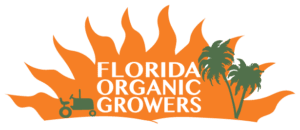
Contact
5700 SW 34th Street Suite 349
Gainesville, FL 32608
p: 352.377.6345
OUR PARTNERS
View a list of our partner organizations. Be sure to support them whenever you can, they are an integral part of the F.O.G. Family!

